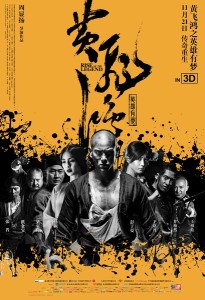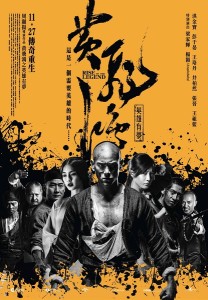Rise of the Legend
黄飞鸿 英雄有梦
Hong Kong/US/China, 2014, colour, 2.35:1, 3-D (China only), 130 mins.
Director: Zhou Xianyang 周显扬 [Roy Chow].
Rating: 7/10.
Vigorous re-imagining of martial arts hero Huang Feihong has classy production values.
Huangpu Docks, Zhujiang Delta, Guangzhou province, China, 1868. The Qing dynasty has been gradually weakened during the 19th century by rebellions, wars, natural disasters, economic problems and invasions. Gangs fight for control of the docks, with longtime competition at Wharf No. 1 between the powerful Black Tiger Gang, led by Lei (Hong Jinbao), and the North Sea Gang, led by Wu (Chen Zhihui). A young fighter, Huang Feihong (Peng Yuyan) – son of Huang Qiying (Liang Jiahui), a doctor who ran an orphanage – arrives with seven other wannabes to compete for the title of No. 4 in the Black Tiger Gang. Lei challenges them to kill Wu. After a ferocious fight with the North Sea Gang, Huang Feihong brings back Wu’s head and is appointed No. 4, alongside Lei’s other chief enforcers: Tiger No. 1, North Evil (Feng Jiayi); Tiger No. 2, Black Crow (Byron Mann), who’s in charge of gambling; and Tiger No. 3, Snake (Li Kaixian), who controls prostitution. Heavily wounded, Huang Feihong is nursed  back to health by one of the other contenders, Big Tooth (Wang Zulan), who becomes his trusted follower. Lei hangs up Wu’s head in public to show who’s undisputed boss of Wharf No. 1 and launches a war of annihilation against the rest of the North Sea Gang. However, Wu’s son, Wu Long (Zhang Jin), manages to escape into hiding, swearing to avenge his father’s death. Meanwhile, another fighter in the district, Fiery (Jing Boran), is also out for revenge on Lei, and has set up the Orphan Gang along with childhood friend Chun (Wang Luodan), who wants to avenge the death of her parents. Fiery is in love with Chun, but she secretly loves Huang Feihong. When young, Fiery was a sworn brother of Huang Feihong, and both have an elaborate long-term plan to avenge the death of Huang Qiying. Huang Feihong starts setting Lei’s chief enforcers against each other in order to gain copies of the keys to Lei’s private warehouses in which he has stashed silver and tobacco. Also secretly joining Huang Feihong, Fiery and Chun is Xinlan (Angelababy), who was sold into prostitution at a young age and works on the Jinling Courtesan Boat. Xinlan shares a past with the other three and is regularly visited by Huang Feihong.
back to health by one of the other contenders, Big Tooth (Wang Zulan), who becomes his trusted follower. Lei hangs up Wu’s head in public to show who’s undisputed boss of Wharf No. 1 and launches a war of annihilation against the rest of the North Sea Gang. However, Wu’s son, Wu Long (Zhang Jin), manages to escape into hiding, swearing to avenge his father’s death. Meanwhile, another fighter in the district, Fiery (Jing Boran), is also out for revenge on Lei, and has set up the Orphan Gang along with childhood friend Chun (Wang Luodan), who wants to avenge the death of her parents. Fiery is in love with Chun, but she secretly loves Huang Feihong. When young, Fiery was a sworn brother of Huang Feihong, and both have an elaborate long-term plan to avenge the death of Huang Qiying. Huang Feihong starts setting Lei’s chief enforcers against each other in order to gain copies of the keys to Lei’s private warehouses in which he has stashed silver and tobacco. Also secretly joining Huang Feihong, Fiery and Chun is Xinlan (Angelababy), who was sold into prostitution at a young age and works on the Jinling Courtesan Boat. Xinlan shares a past with the other three and is regularly visited by Huang Feihong.
REVIEW
After almost two decades, Huang Feihong bestrides the big screen again in Rise of the Legend 黄飞鸿 英雄有梦, a muscular re-imagining of the legendary martial artist-cum-physician (1847-1924) who’s fuelled almost 100 movies in Hong Kong alone, including a series of Cantonese quickies between the 1940s and 1970s starring the late Guan Dexing 关德兴 [Kwan Tak-hing] and the Once Upon a Time in China 黄飞鸿 series (1991-97) with Li Lianjie 李连杰 [Jet Li] and Zhao Wenzhuo 赵文桌 [Vincent Zhao]. With 32-year-old Taiwan actor Peng Yuyan 彭于晏 [Eddie Peng] now in the lead role, Legend focuses on Huang Feihong’s early years, as a wannabe fighter out to avenge his father’s death in the crime-riddled docks of late 19th-century Guangzhou city. Vigorously directed by Hong Kong’s Zhou Xianyang 周显扬 [Roy Chow] – whose two previous movies, the lame crime dramas Murderer 杀人犯 (2009) and Nightfall 大追捕 (2012), gave no clue of his capabilities – it’s a highly cinematic action drama that’s strictly formulaic but is given considerable heft by its cast and packaging.
Like all the films, this one bears no relation to Huang Feihong’s actual life and simply uses his name to head a martial arts movie. Unlike in the Once Upon a Time series, however, Huang Feihong isn’t portrayed as a nationalist hero battling westernisation in a period of major change. Legend is a simple revenge movie, with Huang Feihong going undercover in a docks gang to execute a long-limbed plan – along with his childhood friends – to take down its ruthless leader. En route, he also helps the poor and tries to implement his father’s dictum that saving life (however bad) is always better than taking it. But the humanitarian and philosophical aspects never get in the way of the main drama.
Peng, who’s buffed up before in Jump Ashin! 翻滚吧!阿信 (2011, as a gymnast) and Unbeatable 激战 (2013, as a boxer), acquits himself believably in the action sequences, helped by veteran Hong Kong action director Yuan Kui 元奎 [Corey Yuen], slick visual effects and slo-mo, and sharp editing by the experienced Zhang Jiahui 张嘉辉 [Cheung Ka-fai]. It’s when the fights and posing stop that Peng, who’s always seemed more at home in romances (Hear Me 听说, 2009) or rom-coms (Love You You 夏日乐悠悠, 2011), is less impressive, creating zero chemistry with his female co-stars, only slightly more with his male ones, and being completely wiped off the screen whenever the ruthless villain of Hong Kong veteran Hong Jinbao 洪金宝 [Sammo Hung] is around. Peng has always been a victim of his boyish looks, and if Legend is to birth another Huang Feihong franchise he still needs to work on his acting – which is also hobbled here by a noticeable Taiwan accent among all the gruffer Mainland voices.
Zhou’s regular writer Du Zhilang 杜致郎 [Christine To] has come up with a much stronger script and better dialogue this time, even though the characters are all stereotypes from a thousand Hong Kong martial arts movies. However, the over-busy construction doesn’t build as much character tension as it should, with some roles bittily developed and the multiple flashbacks, especially in the middle section, awkward. Helping to smooth over the bumps, however, is the packaging which, led by the overcast widescreen photography of Wu Wenzheng 伍文拯 and grey warehouses and backstreets of p.d. Huang Bingyao 黄炳耀 [Pater Wong], is exceptionally smooth; both build a distinctive look that’s much more realistic than the Once Upon a Time series.
With Hong Kong’s vfxNova Digital among the presenting companies, the visual effects also form a major part of the movie and, though flashy, are also exceptionally well integrated into the drama rather than being just distracting. A three-minute, post-title sequence, which takes the viewer from the skies above Guangzhou into the wharves and warehouses below in a single breath, is just one example. Only in the finale, set in a burning warehouse, do the effects get in the way of the action.
Of the two female roles, China’s Wang Luodan 王珞丹 (the kooky reporter in Caught in the Web 搜索, 2012, the jaded prostitute in The Continent 后会无期, 2014) has an interesting character that’s shortchanged by the script; in a courtesan role that comes and goes, Yang Ying 杨颖 [Angelababy] is okay but generates no sparks this time from Peng, with whom she’s previously worked several times. In fact, the film’s sexiest scene is a cat-and-mouse seduction between Yang and fellow Mainlander Feng Jiayi 冯嘉怡, as the villain’s chief sidekick, which ends particularly badly for one of them. Feng leads a flavoursome line-up of supporting players, including Chinese American actor Wen Feng 文峰 [Byron Mann] as a fellow enforcer, Mainland singer-actor Jing Boran 井柏然 (Up in the Wind 等风来, 2013) as an avenger and, too briefly, Hong Kong’s Wang Zulan 王祖蓝 as a lighter-hearted disciple. Hong Kong veteran Liang Jiahui 梁家辉 [Tony Leung Ka-fai] pops up in flashbacks as Huang Feihong’s father.
The film’s Chinese title means “Huang Feihong: Hero with a Dream”. The end titles show photos and drawings from the period, underlining the close-to-reality production design by Huang and costumes by Wang Baoyi 王宝仪. Shooting took place entirely in China, with a chunk in the backstreets of well-known heritage town Wuzhen, in Zhejiang province, south of Shanghai.
CREDITS
Presented by BDI Films (CN), Edko Films (HK), Irresistible Alpha (HK), Universal Pictures International (US), vfxNova Digital Productions (HK). Produced by Irresistible Films Production (HK), Universal Pictures International Productions (US).
Script: Du Zhilang [Christine To]. Photography: Wu Wenzheng. Editing: Zhang Jiahui [Cheung Ka-fai], Deng Wentao. Music: Umebayashi Shigeru. Additional music: Jin Peida [Peter Kam]. Theme song: Mayday. Production design: Huang Bingyao [Pater Wong]. Art direction: Lan Bin. Costume design: Wang Baoyi. Sound: Chen Weixiong, Li Yaoqiang. Action: Yuan Kui [Corey Yuen]. Martial arts direction: Wei Yuhai, Guo Yong, Liu Fang. Visual effects: Huang Hongda, Zhang Zhonghua.
Cast: Hong Jinbao [Sammo Hung] (Lei, master), Peng Yuyan [Eddie Peng] (Huang Feihong), Wang Luodan (Chun), Jing Boran (Chihuo/Fiery), Zhang Jin (Wu Long, North Sea Gang leader’s son), Wang Zulan (Da Yasu/Big Tooth), Qin Junjie (Liang Kuan), Feng Jiayi (Beisha/North Evil), Wen Feng [Byron Mann] (Heiya/Black Crow), Gao Taiyu (Lin Shirong), Liang Jiahui [Tony Leung Ka-fai] (Huang Qiying, Huang Feihong’s father), Yang Ying [Angelababy] (Xinlan/Orchid/Lu Xiaohua), Li Kaixian [Brian Siswojo] (Lao She/Snake), Chen Weixiong (Fattie), Jiang Zhongwei (Smiley Face), Luo Beian (Buddhist monk), Chen Zhihui (Wu, North Sea Gang leader), Fan Guangyao (blind storyteller), Jiang Xiaoliang (foreign businessman), Liang Lele (young Feihong), Hu Shun’er (young Chun), Yuan Mengyu (young Chihuo), Zhang Zimu (young Xiaohua), Zhang Ying (pipa player).
Premiere: Hong Kong Asian Film Festival (Closing Film), 14 Nov 2014.
Release: China, 21 Nov 2014; Hong Kong, 27 Nov 2014; US, tba.
(Review originally published on Film Business Asia, 8 Feb 2015.)
